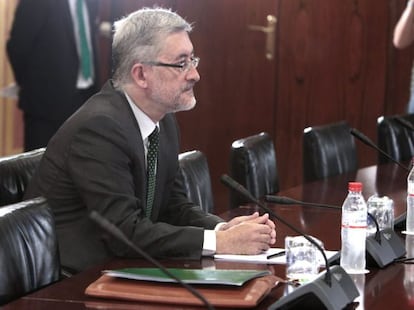Investigation into ERE scandal reveals cost to state of 17 million euros
Funds are yet to be recovered despite 18 month investigation into fraud


After an 18-month investigation, the true extent of the damage caused by the ERE scandal in Andalusia is beginning to emerge.
The case involves public funds that were meant to be used to pay early retirement compensation at Andalusian firms carrying out labor adjustment plans with numerous layoffs, known as EREs.
Since 2001, the regional government has paid out 647 million euros to struggling firms, of which 560 million euros was used for EREs at companies undergoing a restructuring process. Over 5,500 employees benefited from these subsidies, but authorities have since found 196 beneficiaries who were not eligible in the first place, with another 45 still under investigation. Some individuals applied fraudulently, pretending to work at companies that were receiving the funds, while others were granted the money through administrative mistakes. Among these unlawful recipients of state funds, there are nine members of the Socialist Party, which has governed in the region since 1980.
The Andalusian government calculates that the fraud has cost regional coffers a maximum of 17 million euros. But until now, nobody has returned a single cent, due to legal safeguards that allow the suspects to defend their cases.
The instrument is being unfairly criminalized," said Antonio Ávila
Antonio Ávila, commissioner of the department of economic, innovation, science and employment affairs, spoke before a parliamentary investigation committee on Tuesday, revealing that the initial 647-million-euro fund ended up costing more than 1.2 billion euros, due to debt-refinancing operations and late fees.
Besides trying to recover the 17 million euros that it assigned to the wrong people, the regional government is also reviewing the 106 million euros it gave to companies, local authorities, private foundations and universities through 191 direct subsidies; only seven of these are due to be returned.
If the fraud had not been detected in time, the unlawful recipients of ERE aid would have received an additional 15 million euros, and companies would have been awarded 29 million more.
In his parliamentary appearance, Ávila sought to play down the scandal and underscored that during the 10 years that were investigated (2001-2010), 81,464 Andalusian workers were affected by EREs; of these labor adjustment plans, only 7.9 percent received public funds, and out of these, only 0.29 percent show alleged irregularities.
I had never seen a case like this one," said the regional comptroller
"The instrument is being unfairly criminalized," said Ávila.
Faced with criticism from United Left spokeswoman Alba Doblas over the "slipshod" system created by the government that enabled fraud - and with suspicions by the Popular Party that the system was created specifically to facilitate fraud - Ávila insisted that the problem lay in the decision by a few people to "skip over the procedures."
The commissioner did admit to a lack of legislation establishing oversight mechanisms for the granting of aid; instead, the system was based on a 2001 agreement that allowed the regional employment department to hand out the subsidies without review by the paying agency, Idea.
Next to testify after Ávila was Manuel Gómez, the former regional comptroller, who said his office found up to 15 mistakes and breaches in connection with the subsidies in a series of internal reports that covered the 2005-2008 period.
"I had never seen a case like this one," said Gómez.
The key lies in the fact that the comptrollers analyzed the payments by Idea, but the agreements were signed and kept at the employment department. The Office of the Comptroller sounded the alert about the irregularities some time ago, although it stopped short of talking about an unlawful use of public funds. Gómez illustrated the case with this telling story: "If your neighbor screamed at you through the window that there are flames in the extractor fan, would you call the fire department to avoid a disaster or would you wait for your neighbor to send you a letter confirming the news? We issued a warning about this, and whoever had to make decisions didn't make them; the irony is that the person who failed to make decisions is now complaining that he was not warned in time," said Gómez, in reference to former employment commissioner Antonio Fernández and his predecessor, deputy José Antonio Viera.
Last week, both men alleged that the Office of the Comptroller never issued the report that would have warned authorities about a code red regarding the unlawful allocation of public funds. Gómez also did not clear up whether the reports ever reached the regional premier. José Antonio Griñán.
From the warning by comptrollers to the law of the commissioners
Antonio Ávila, commissioner of the economic, innovation, science and employment department. Ávila has offered figures on the internal investigation to detect fraud. Up to 245 people could have unlawfully received as much as 17 million euros. At the same time, the regional government is reviewing 191 direct subsidies to firms, local authorities, foundations and universities for a total worth of 106 million euros. The government had committed to handing out 135 million in total. Ávila defended the legality of the system, since every year it was approved during the budget debate at the Andalusian parliament. However, he admitted to a lack of oversight for the procedure and the irregular way in which the employment commissioner passed on his powers to the director general of employment.
Manuel Gómez, former comptroller at the Andalusia region between 2000 and 2010 , has stressed the exceptional nature of the aid system and the alerts it created in his own department. "I have never seen a case like this one," he said. The comptrollers warned about the irregularities, although the system was deemed legal. The aid granting "totally and absolutely did away with the legally established procedure." This kind of criticism was ignored by the former employment commissioners Antonio Fernández and José Antonio Viera, who last week claimed that the Office of the Comptroller never warned them about the misallocation of public funds. "We warned them, and whoever had to make decisions did not; the irony is that the person who failed to make decisions is now complaining that he was not warned in time," said Gómez
Tu suscripción se está usando en otro dispositivo
¿Quieres añadir otro usuario a tu suscripción?
Si continúas leyendo en este dispositivo, no se podrá leer en el otro.
FlechaTu suscripción se está usando en otro dispositivo y solo puedes acceder a EL PAÍS desde un dispositivo a la vez.
Si quieres compartir tu cuenta, cambia tu suscripción a la modalidad Premium, así podrás añadir otro usuario. Cada uno accederá con su propia cuenta de email, lo que os permitirá personalizar vuestra experiencia en EL PAÍS.
¿Tienes una suscripción de empresa? Accede aquí para contratar más cuentas.
En el caso de no saber quién está usando tu cuenta, te recomendamos cambiar tu contraseña aquí.
Si decides continuar compartiendo tu cuenta, este mensaje se mostrará en tu dispositivo y en el de la otra persona que está usando tu cuenta de forma indefinida, afectando a tu experiencia de lectura. Puedes consultar aquí los términos y condiciones de la suscripción digital.








































